Bookkeepers have always been important to society. It is believed that the profession stretches back to the early days of civilization when bookkeepers used clay tablets to keep account of the trade by barter system. Though the business world has evolved, firms can not function without bookkeeping, as statistics show that company profits increase by 15% after they hire bookkeepers.
A new study shows that bookkeeping jobs are expected to fall by 5 percent between 2021 and 2031; however, roughly 200,500 new bookkeeping positions will come up annually. These statistics highlight the importance of a well-written résumé for job-seeking bookkeepers in a highly competitive job space. This article will guide you on how to write a resume that can earn you a bookkeeping position.
What is a Bookkeeper’s Resume
A bookkeeper’s resume is an official document outlining the candidate’s credentials, experience, skills, education, and achievements in bookkeeping.
This document, if properly written, can help you get your desired job. A resume for a bookkeeping position is typically accompanied by a cover letter in which the applicant introduces themselves, shows enthusiasm for the position, and highlights their most relevant experience and qualifications.
Who is a Bookkeeper?
A bookkeeper is an employee in charge of documenting and tracking a company’s financial operations, including purchases, expenditures, earnings, invoices, and payments.
They analyze large volumes of transactions with the help of software systems and record the financial information into ledgers, which form the income statement and balance sheet.
Duties of a bookkeeper
A bookkeeper is a primary repository for most of the company’s financial and payroll data. A bookkeeper is the backbone of an accounting team as they manage all the ledgers utilized to generate critical financial reports. A bookkeeper’s job description should specify that an ideal applicant is one who is organized and passionate about math and accounting data.
Other duties and responsibilities of a bookkeeper include:
- Identification and transfer of transactions, such as receipts and payments, to numerous accounts.
- Processing transactions.
- Carrying out routine banking operations.
- Creating a range of financial reports.
- Comparing reports to records held by external parties, such as bank statements.
- Active participation in creating budgets for internal and external auditing records.
- Serving as administrative and clerical support to other workers.
- Facilitating communication between workers and other parties like contractors and financiers.
- Making sure all critical information is crosschecked, and errors are fixed.
As a bookkeeper, you should know how to effectively incorporate relevant skillsets and achievements in your resume because hiring managers pay special attention to a resume when determining if an applicant has the necessary abilities to succeed. While every applicant’s resume is personal, some standard sections must be present in a job-winning resume.
These sections include:
- Header/contact information
- Summary or objective
- Work history
- Education and credentials
- Skills and achievements
Choose the Best Resume Format for a Bookkeeper Resume
Different resume formats are available to you, which can significantly impact your initial impression and subsequent interview outcomes. However, picking the proper resume format according to your work experience level can improve your chances of being spotted by applicant tracking systems (ATS).
The popular resume formats include:
Chronological
The chronological resume style is universally recognized as the most professional-looking and practical format. Recruiters often favor this style since it leaves room for far less speculation throughout the recruiting process. The chronological resume is the most common format and presents your work history schematically. It puts your skills in perspective, making it easier for a recruiter to comprehend how they relate to your professional history.
This resume layout is optimal for:
- Bookkeepers with extensive experience in the same field
- Bookkeepers who want to highlight their rapid professional advancement
In a chronological resume, the emphasis is on your professional experience. You should provide your employment history in reverse chronological order, starting with your most recent position. Also, remember to include relevant statistics and metrics wherever available when describing the results you achieved for previous companies.
Functional
Although not advised, the functional resume format is an alternative for those whose work history does not conform to a chronological format. This format is the polar opposite of the chronological format. It places less emphasis on targeted work experience and provides space to highlight education, training, and professional achievements. The order in these sections is up to you and should reflect your job experience and personal preferences.
Hybrid
Hybrid resumes are a recent trend in resume formats, combining parts of the chronological and functional resume styles for a unique, creative product. This streamlined resume first highlights applicants’ most relevant skills and experiences, followed by their extensive work history. An effective hybrid resume will have a list of qualifications and work history in reverse chronological order. This structure is adaptable and may take many shapes depending on your needs.
Key Sections of a Bookkeeper Resume
You should include the following sections in your resume to provide potential employers with a complete image of your bookkeeping credentials, skills, and qualities:
Resume summary or objective section
The purpose of both the summary and objective parts of a bookkeeper’s resume is to introduce the bookkeeper to the potential employer. However, an essential resume writing skill is recognizing when to use a summary or objective section. This needs familiarity with the two types of introductions and the appropriate situations to use each.
A resume summary (also known as a professional summary or summary statement) is a professional statement that appears at the top of a resume. After your name and contact information, this section discusses your relevant experience, skills, knowledge, and accomplishments. The career summary should clarify your credentials for the position in three to five phrases and encourage the manager to read the rest of your resume.
Each line of your professional summary must clearly illustrate why you are an ideal candidate for the position. However, the first phrase of your resume summary should always highlight your most marketable professional attributes.
An example of a resume summary for a bookkeeper is:
Bookkeeper/Office Manager with 12 years of experience and competence in Quickbooks, Excel, account reconciliations, cost accounting and records management.
Below are a few pointers to keep in mind while composing your resume’s summary section to give prospective employers a concise yet informative overview of your skills and experience:
- Describe your summary with power adjectives: Writing your summary with prominent power adjectives brings life to past achievements and accomplishments. Using power adjectives is much more likely to catch the hiring manager’s attention and pique their interest than using “basic” and overused terms.
- Try to be informative but brief: Your resume summary should be informative enough to pique employers’ interest and encourage further perusal, but succinct enough to avoid giving away key details discussed further down the resume. Avoid using jargon.
- Always provide pertinent industry information: The specifics of bookkeeping will vary depending on your field of business. However, you can provide a more engaging resume summary by emphasizing the many advances and problems in the field while giving some thought to the needs of the organization to which you are applying.
Unlike a resume summary, a career objective is a concise paragraph outlining your skills and goals to a hiring manager. A resume objective is recommended for an entry-level bookkeeper, and it is where you sell yourself to a potential employer by explaining your career aspirations.
An example of a resume objective is:
Recent college graduate eager to utilize my bookkeeping and financial expertise to assist Glacier Estate in maintaining budgetary discipline as they build new multifamily residences in Vermont. Skilled in Quickbooks, Excel, data entry, and fiscal budgeting to assist in accomplishing the company’s overall objectives and aims.
Skills section
If you know how to incorporate your bookkeeping skills into a resume, you will have a better chance of getting interviews with companies that are a perfect fit. In the skills section of your resume, you can highlight your expertise in bookkeeping and convince the hiring manager that you are the best candidate for the job.
For a skill set section to stand out on a resume, you need to focus on:
- Being able to highlight your best skills in a resume effectively.
- Selecting the appropriate format for your skills based on your previous work experience.
- Recognizing the top-notch skills to highlight in your resume.
If you are applying for a job as a bookkeeper, it is essential to highlight your interpersonal skills or soft skills. While hard skills indicate your suitability for the position, soft skills reveal to recruiters whether or not you have the right personality.
Most modern recruiters use an application tracking system (ATS) to screen out unqualified candidates. Applying this filter narrows the pool of applicants down to those considered the best fit. Using the proper bookkeeper resume keywords is the only way to guarantee that your application will make it past the screening process.
Below is a table of the ATS bookkeeping keywords you should incorporate when writing your skills section:
Technical Skills
- Clerical Skills
- Journal Entries
- Data Entry
- Financial Accounting
- Auditing
- Payroll Taxes
- Cost Accounting
- Spreadsheet Application
- Expense Tracking
- Fiscal Budgeting
- Accounts payables
- Account receivables
- Handle investments
- Spreadsheet work
- Expense tracking
- Data analysis
- GAAP
- Accrual accounting
- Internal funds management
- Liaise with Banks/suppliers
- Operating expenses
- Budgeting
- BAS agent
- P&L management
- Deferral transactions
- Accounting software
- Credit control
- Bookkeeping
Soft Skills
- Detail-oriented
- Reliability
- Solution Oriented
- Adept
- Time management
- Organizing and sorting
- Attention to detail
- Critical thinking
- Active listening
- Multitasking
- Imaginative
- Written and verbal communication
- Task prioritization
- Identifying variance
- Punctuality
- Flexible working hours
An example of a skills section in a resume is:
Bookkeeping
- Managed financial transactions and properly recorded account updates for full disclosure.
- Processed and balanced account receivables and account payables
- Implemented recent updates to spreadsheet applications to reflect current bookkeeping practices.
Solution-oriented
- Provided solutions for mixed-up invoices, files, and receipts to facilitate proper documentation.
- Managed the logistics of holding weekly staff meetings and recording minutes when the meeting facilitator was absent.
- Managed insufficient stock of office supplies by reaching out to the supplier and overseeing the replacement process.
Detail-oriented
- Ensured that the biweekly payroll for contract workers was accurate by verifying their time cards.
- Checked and double-checked procedures for keeping financial records; this should cut down on accounting discrepancies.
Work history
A resume’s work experience section is crucial during the hiring process. This section of your bookkeeper’s resume should include a summary of your professional achievements. Back up your achievements from previous jobs with metrics. Additional details include company names and locations, job titles and duties, the dates you worked there, and how long you were employed.
The job experience section of a bookkeeper’s resume should contain tasks completed and the economic return added by those tasks. Limit yourself to positions you have held in the past decade and emphasize tangible accomplishments. Also, use bullet points to highlight your successes and demonstrate your ability to provide results in your current position.
Pro tip: You can employ the STAR (Situation, Task, Action, and Result) format as a basic framework for narrating your experience and accomplishments in a resume. To use it, do the following: Explain the situation and give relevant details, explain what you were tasked with doing, clearly explain what actions you took, and share the outcomes that resulted from your efforts.
An example of highlighting your work history in your resume is:
Bookkeeper
Work At Tillford Inc.
23 Twyne St, Wisconsin
September 2020 – Current
- Evaluated and revised vendor onboarding procedures, resulting in an annual savings of over $250k.
- Spearheaded full-cycle accounting, contributing to a revenue increase of over $1 million yearly.
- Separated audit data from financial records, cutting monthly data entry time by over 15 hours.
- Planned and executed weekly team meetings for a workforce of 100+ and managed the schedules of executive team members.
- Optimized cash flow by standardizing A/P invoicing practices.
Bookkeeper Intern
Core Technologies
June 2019 – August 2020
47 W 13th St, New York
- Coordinated efforts with interns to provide administrative assistance for the accounting department, including document filing in time to fulfill state mandates.
- Participated in front-office reception weekly, fielding calls and emails which reduced customer turnover by 12%.
- Reduced the number of past due bills by 25%, thanks to the generation of invoices and automatic reminders for their collection.
Education
The applicant’s academic background is one of the few elements that companies scrutinize closely. Your interviewers gain additional insight into your qualifications for the position thanks to the details you provide about your experience and education. This area can instantly distinguish you from other candidates if your schooling is relevant to the post or includes any qualifications necessary for the job.
While a high school diploma or General Equivalency Diploma (GED) is sufficient for entry-level bookkeeping positions, most companies want people with at least an associate’s degree in accounting or business administration. Other relevant coursework and certifications (like QuickBooks, AIPB Certified Bookkeeper, and NACPB Licensed Bookkeeper certification) are welcome additions.
To earn the Certified Bookkeeper (CB) credential from the American Institute of Professional Bookkeepers (AIPB), applicants must meet specific criteria including working as bookkeepers for a minimum of two years. Obtaining the CB designation requires passing a comprehensive four-part test which certifies you for three years. However, you need to take a series of programs to become recertified.
In addition, while reviewing your resume, recruiters have the following fundamental requirements they want to see in your education section:
- School’s name
- Where is your school located
- Your acquired degree
- The year of graduation
- Relevant projects and accomplishments
For example:
University of Washington, Seattle, WA, January 2014 – September 2018
Bachelor of Arts: Accounting
Certifications: QuickBooks, AIPB Certified Bookkeeper, and NACPB Licensed Bookkeeper
Free Templates
While looking for a bookkeeping job can be thrilling, it can also be time-consuming and costly. There will be a lot of competition for bookkeeping jobs, so a great deal of effort has to be put into your resume to make it stand out. Resume templates take away the stress and help you highlight the relevant skills and qualifications that can help you get the job. We have provided customized pre-made templates that you can download for free.
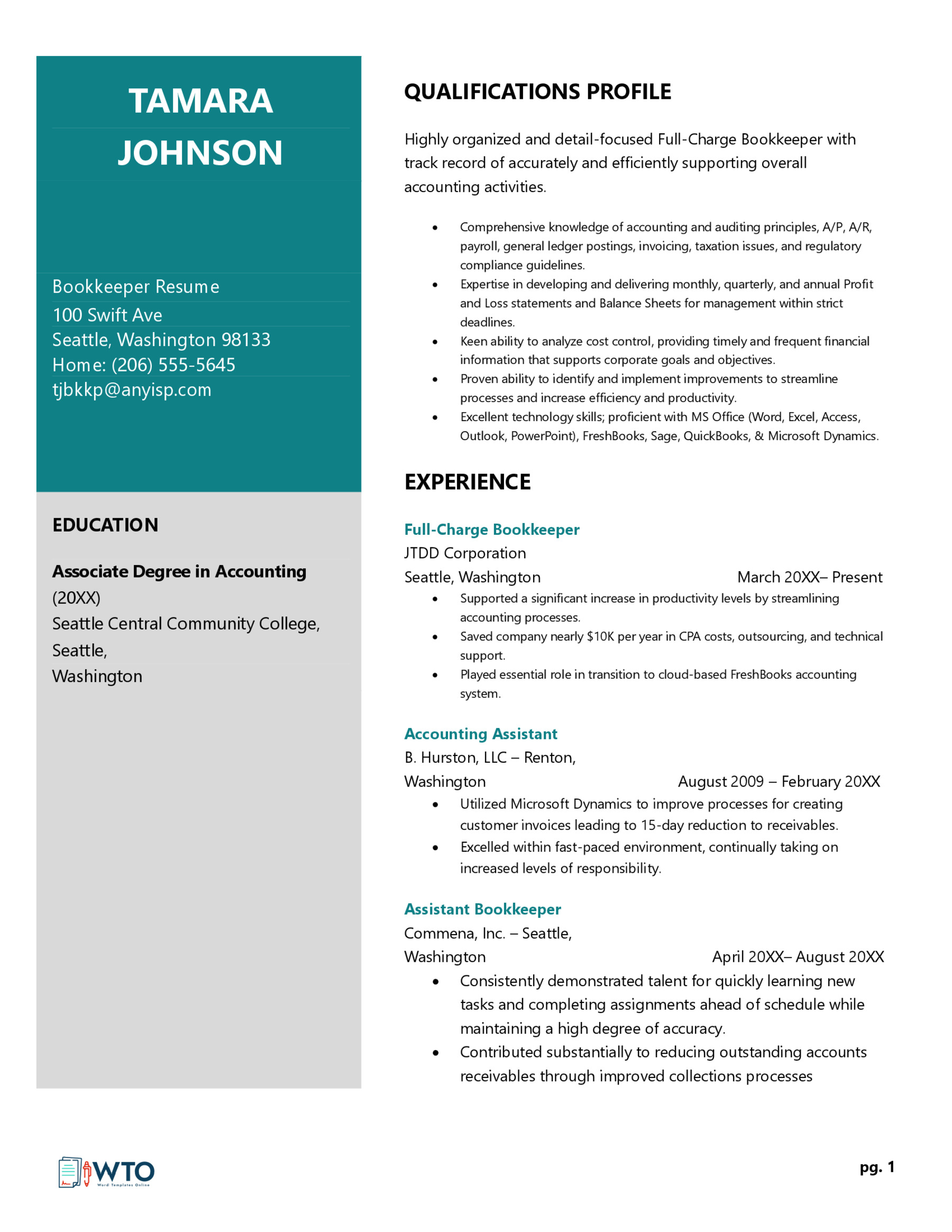
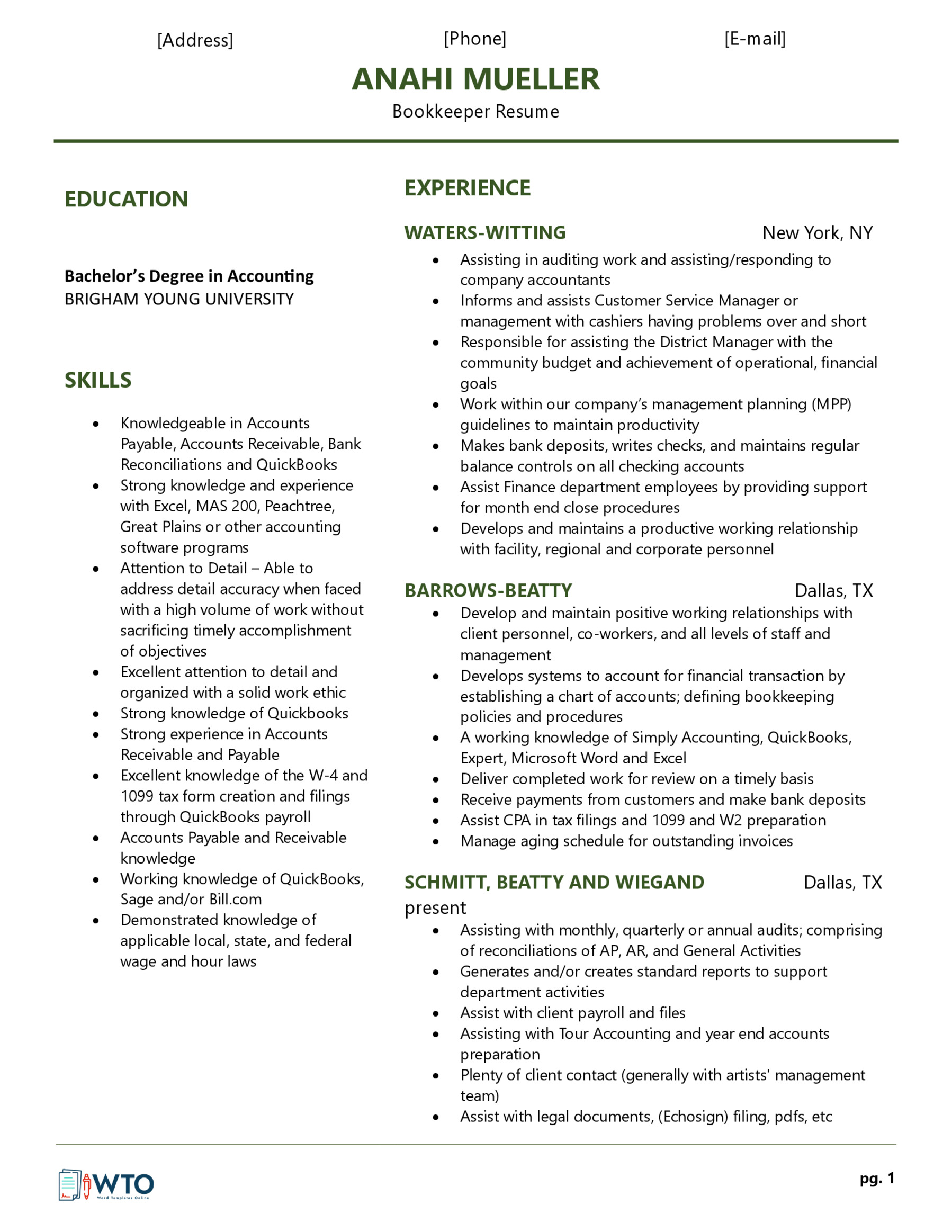
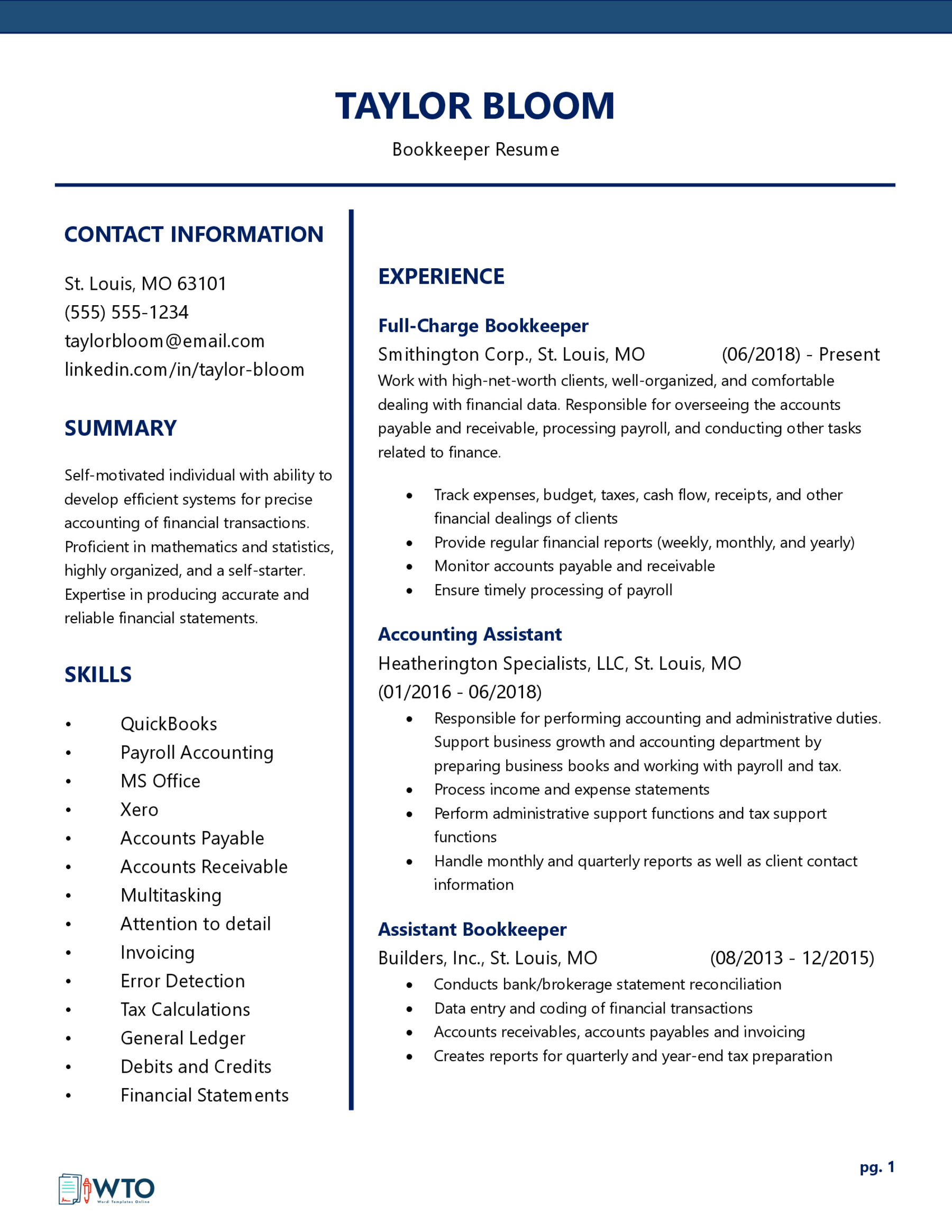

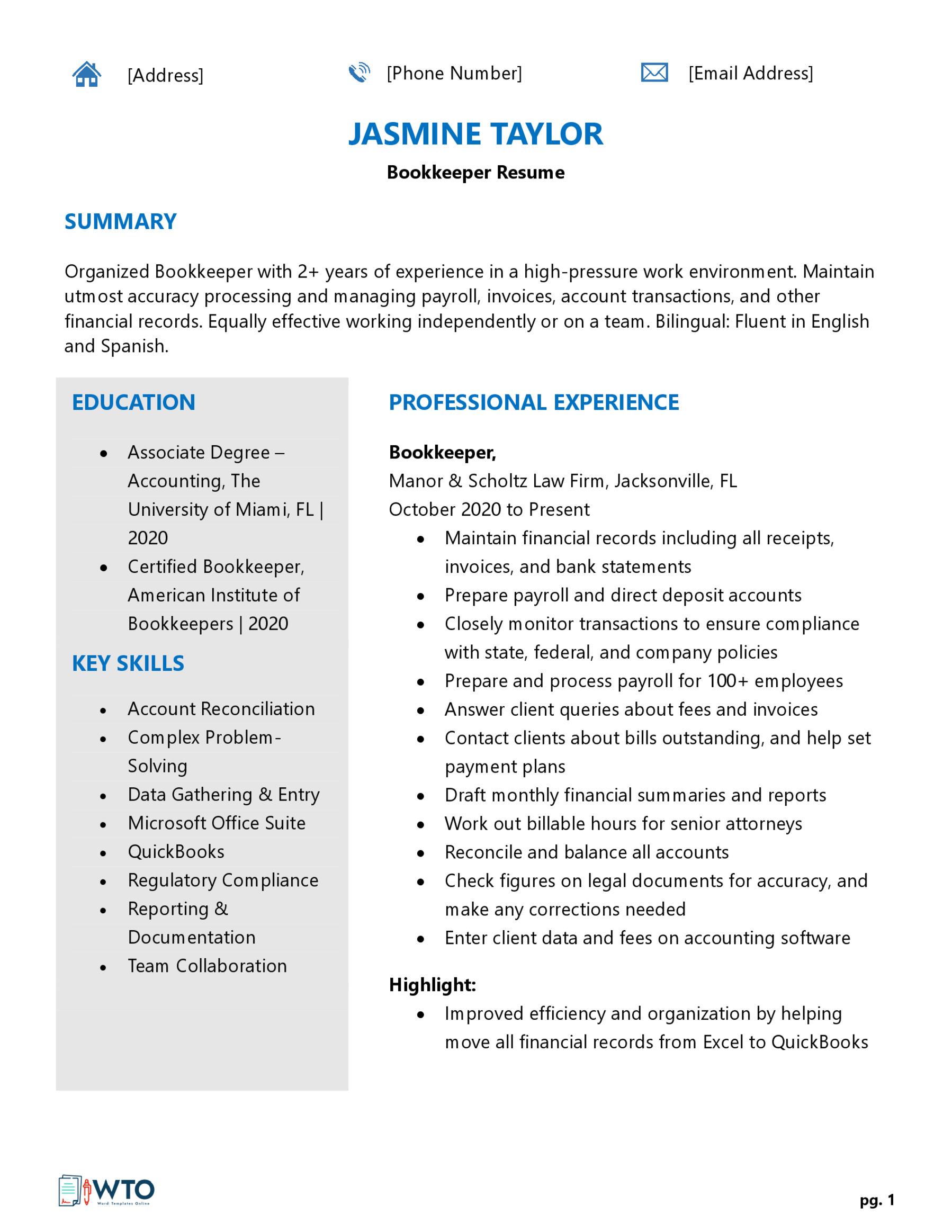
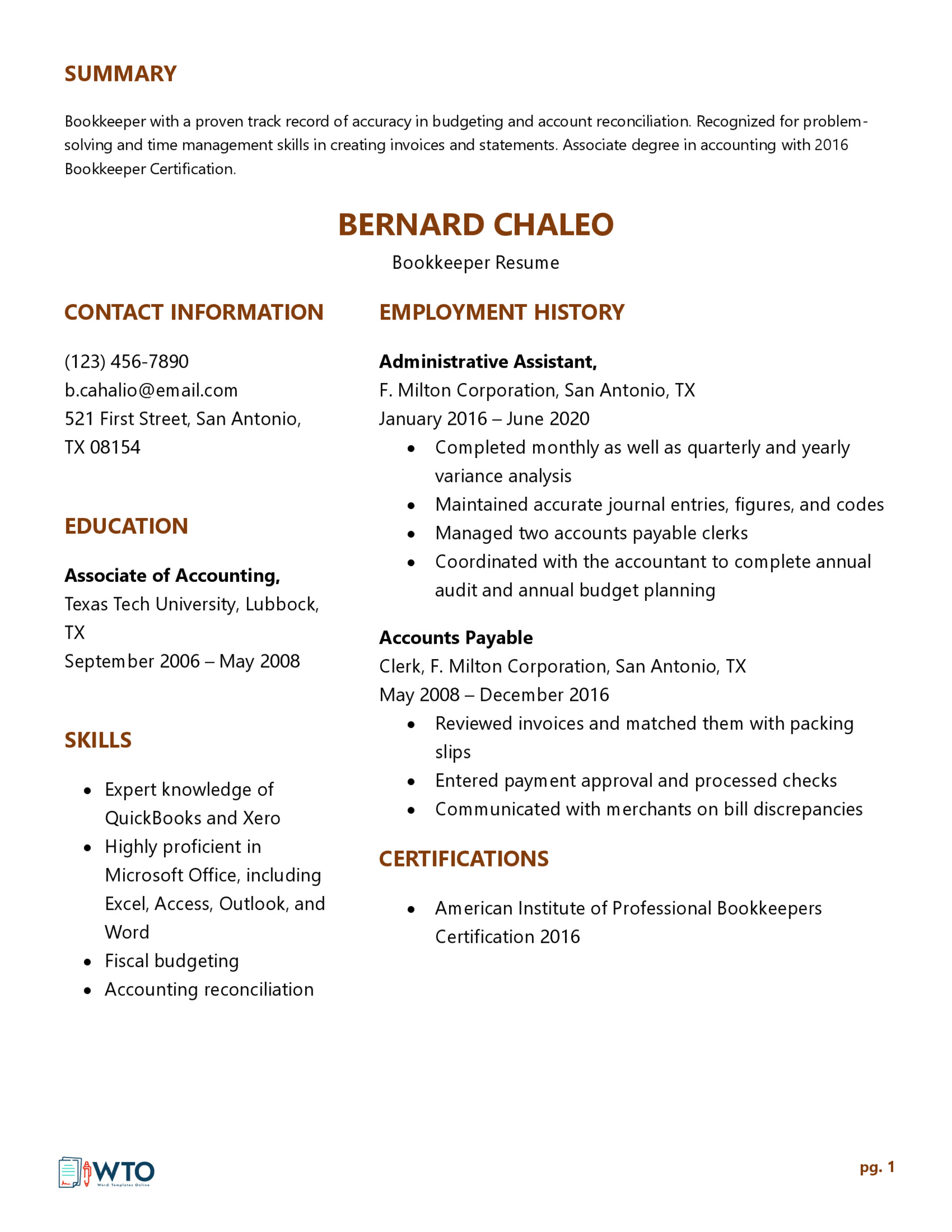
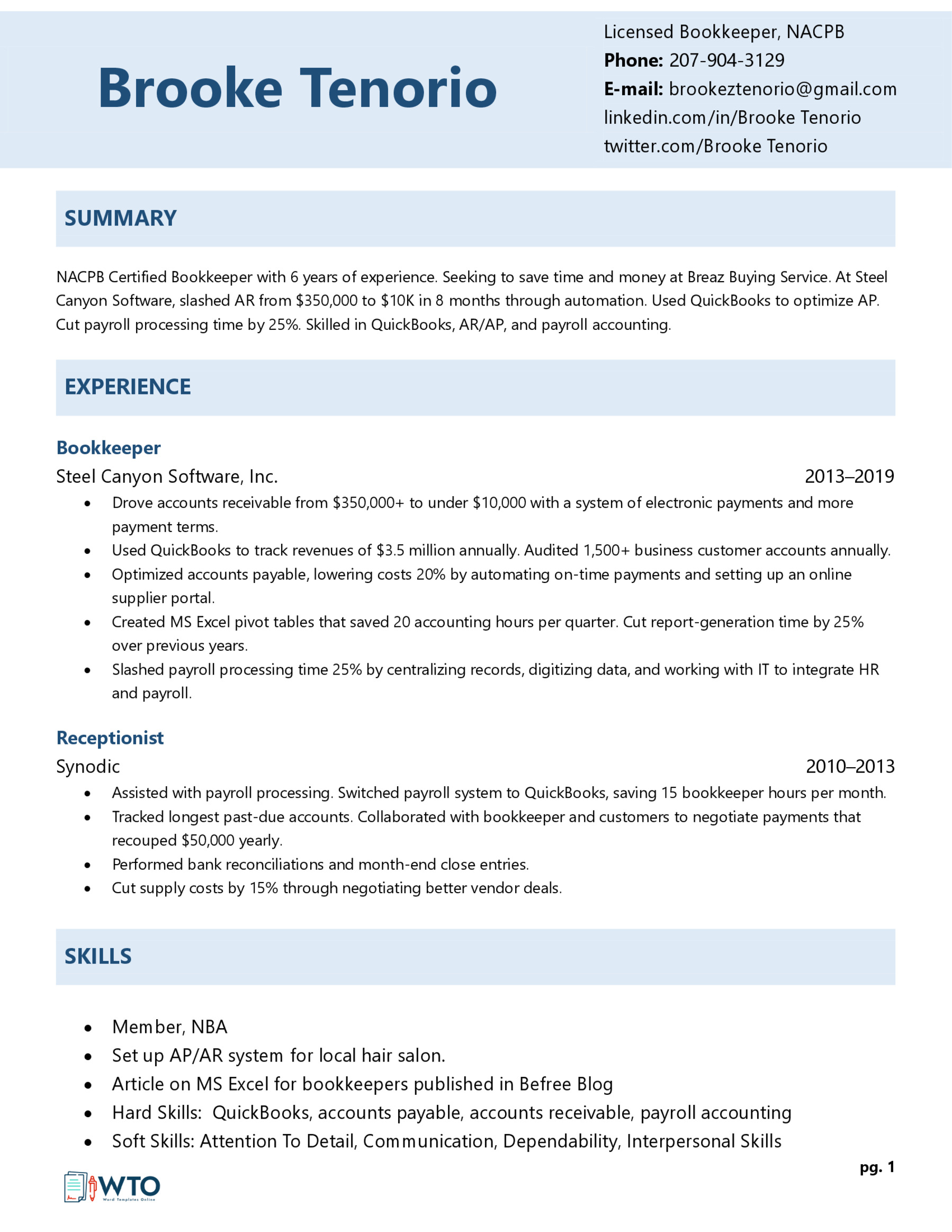
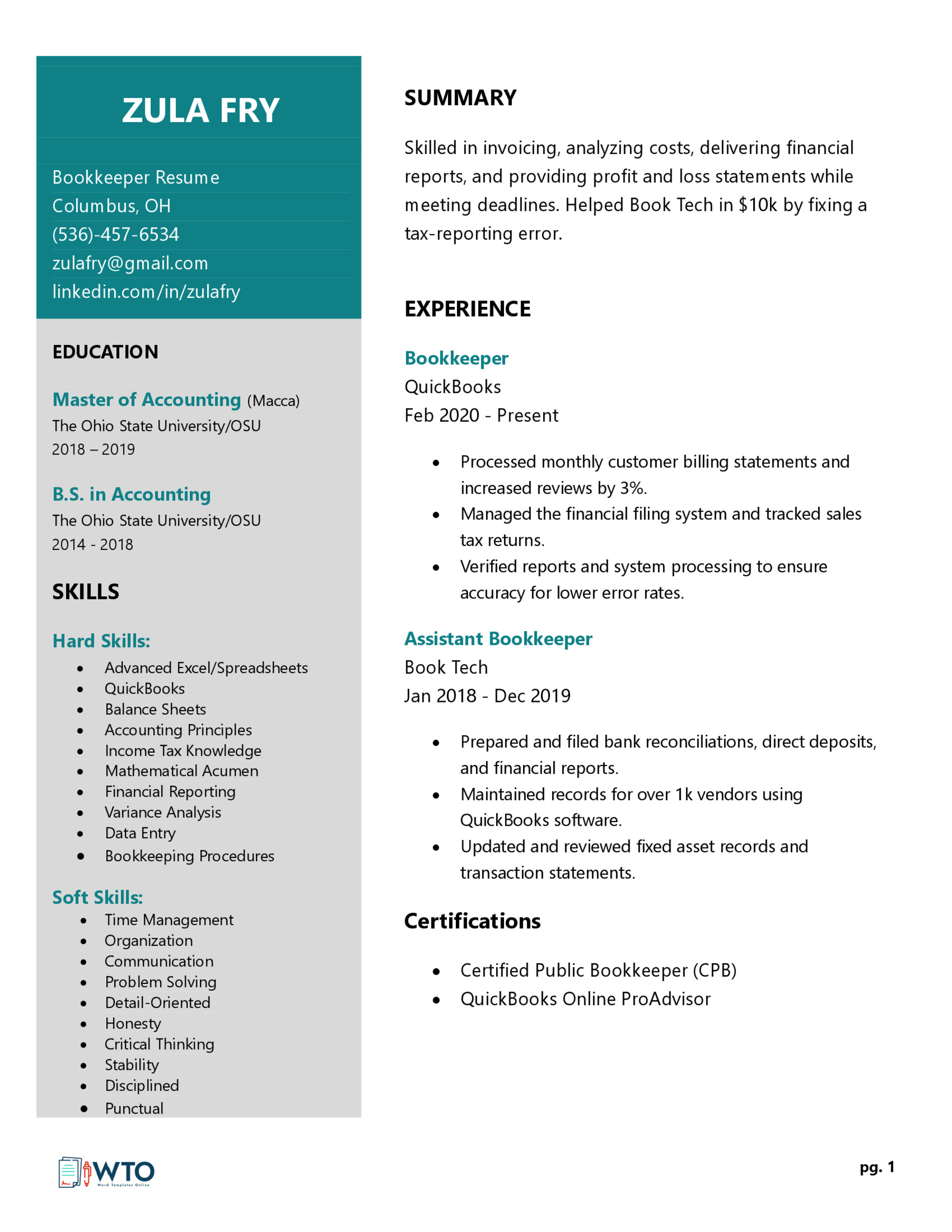
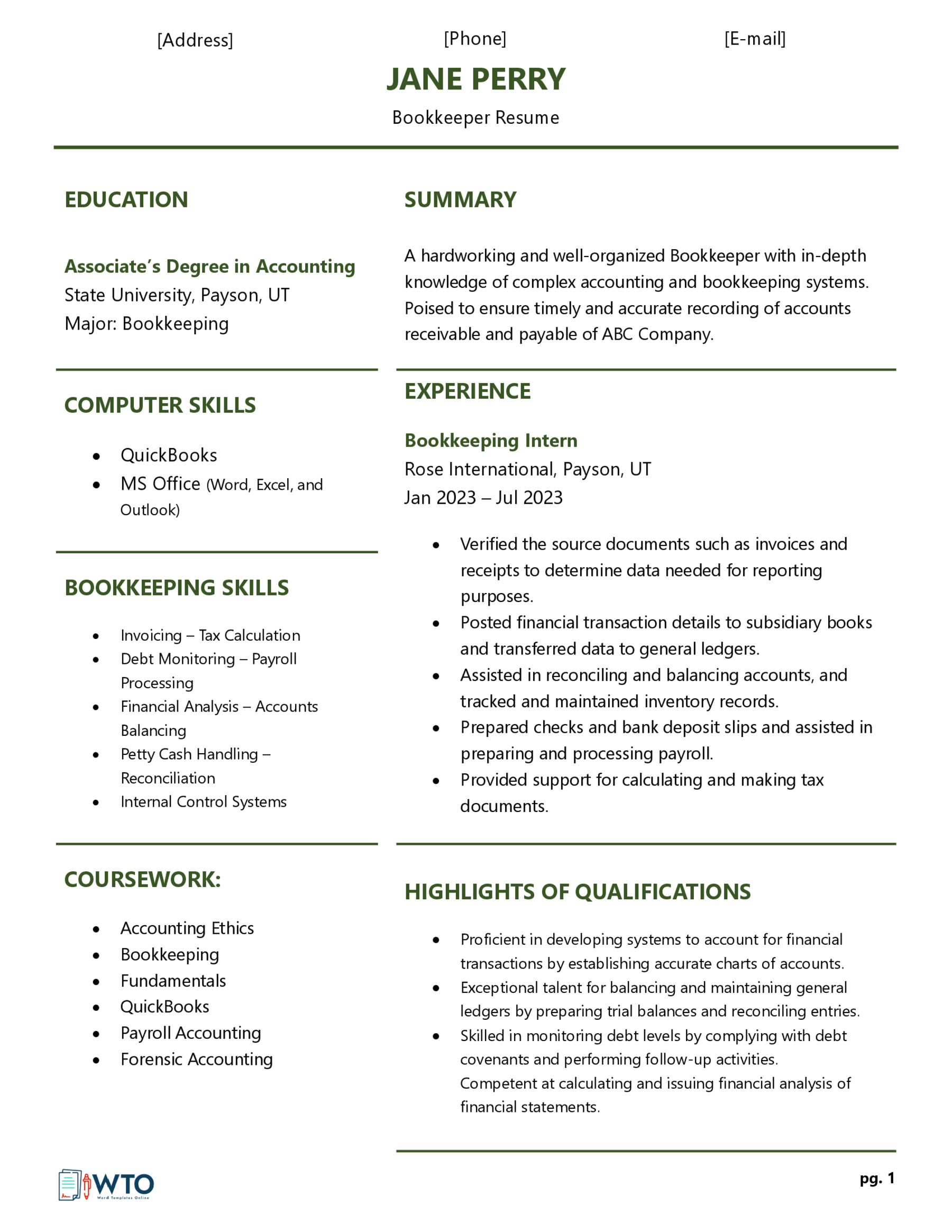
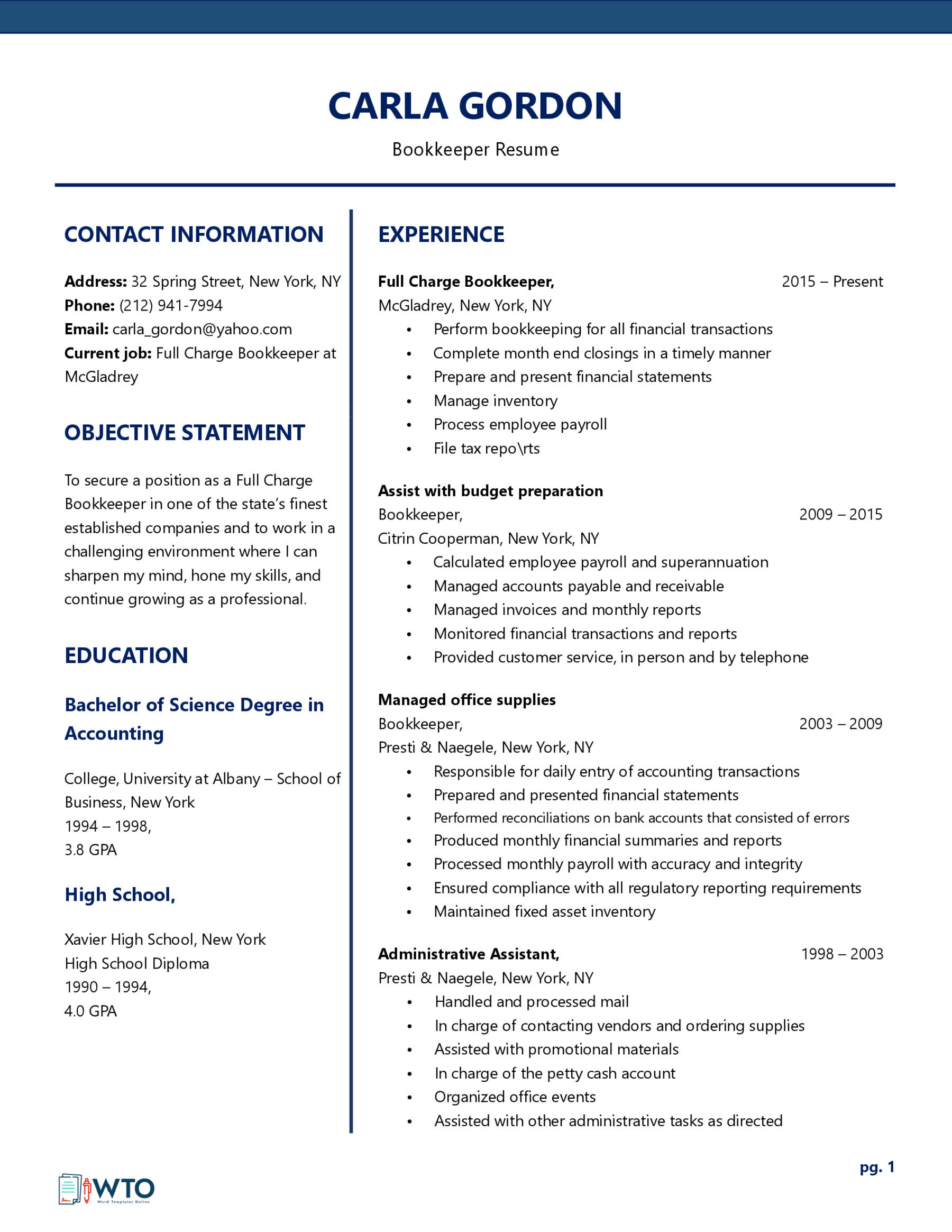
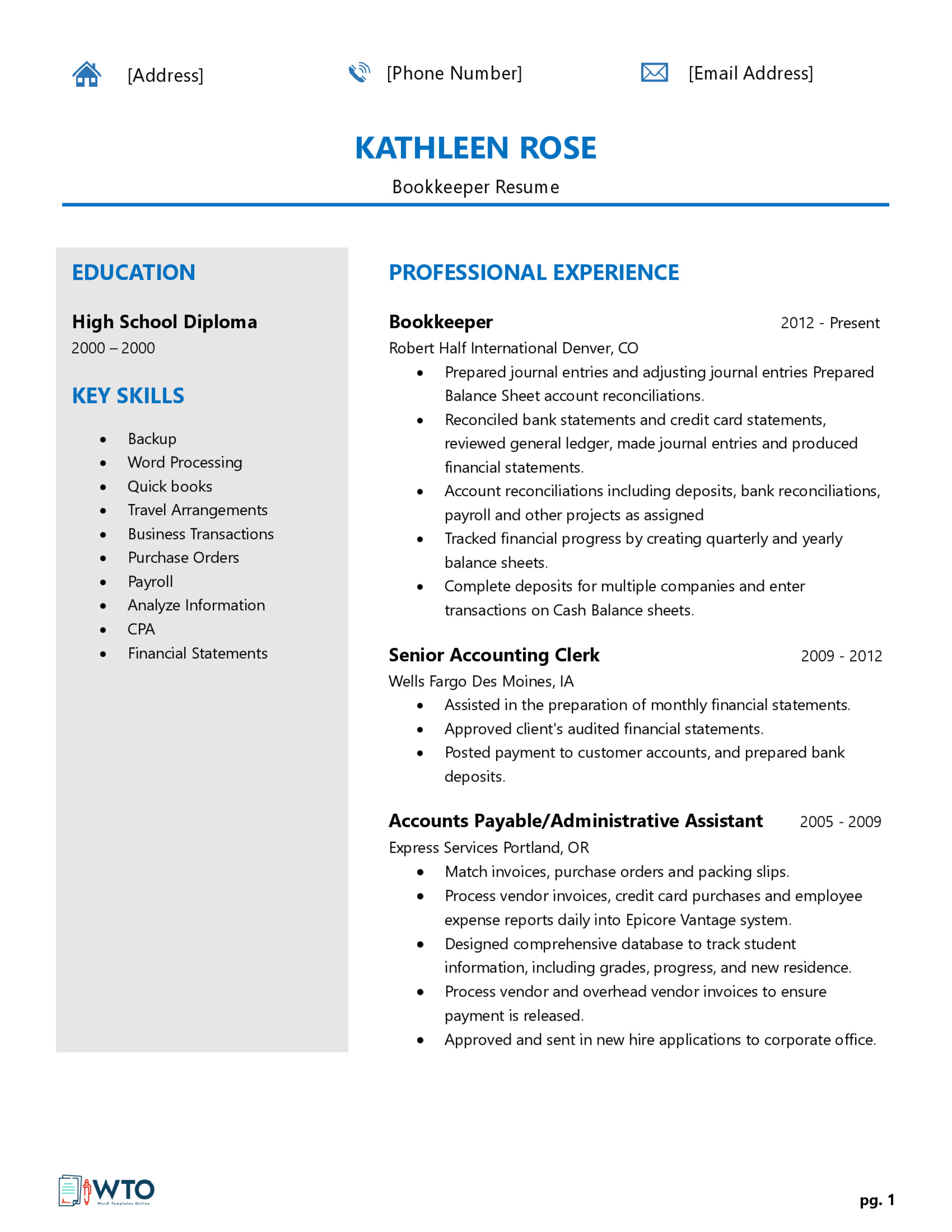
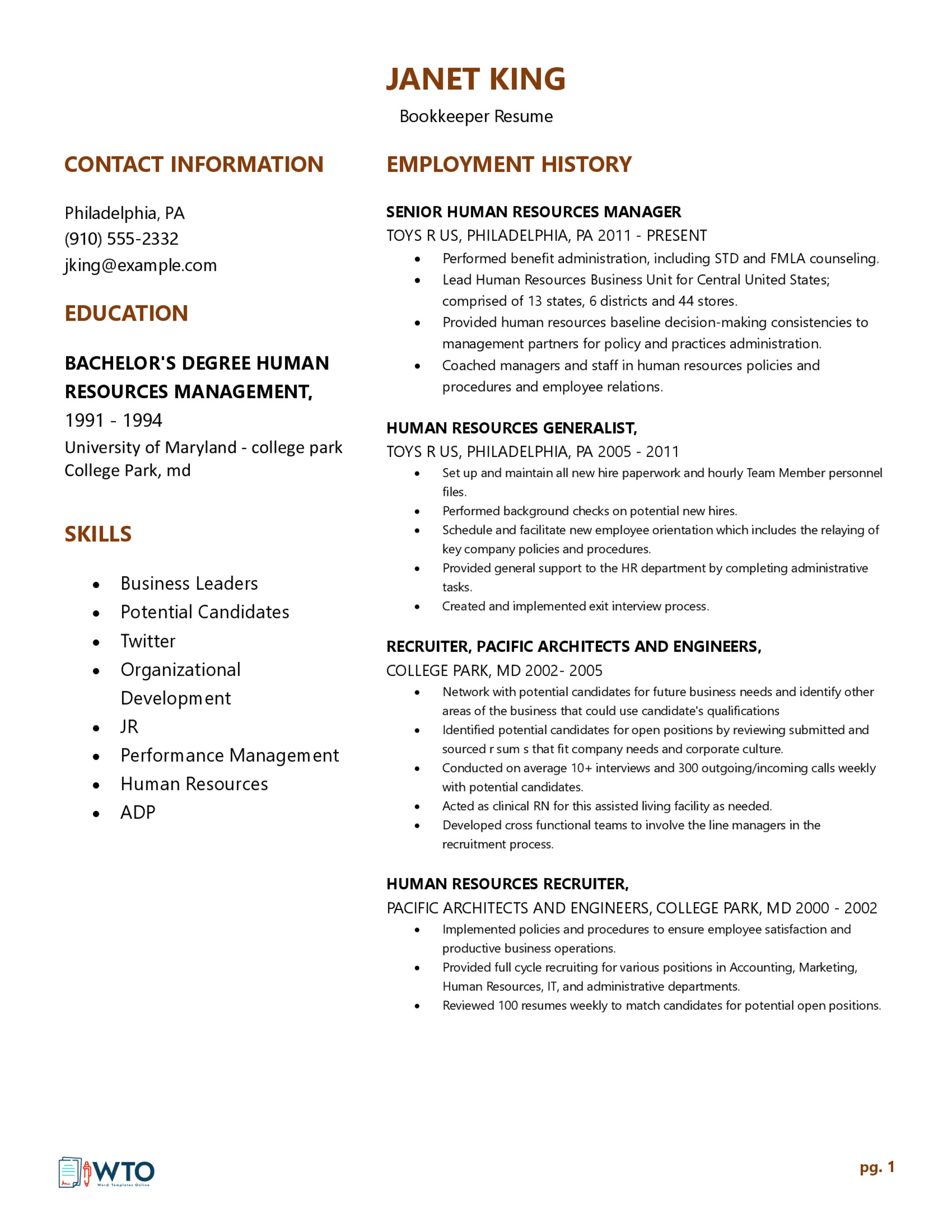
Do’s and Don’ts
A well-written, up-to-date resume is essential when applying for bookkeeping jobs because of the competitive nature of the industry. Below are some suggestions on do’s and don’ts when drafting a resume for a bookkeeper position:
Do’s
You should always keep the following do’s in mind when creating a resume or revising an existing one:
- Do use quantifiable achievements: Be sure to provide relevant figures while discussing your earlier achievements. The most impressive and memorable resumes include quantitative instances of your prior successes. The point is to demonstrate that you understand which KPIs are most important for a bookkeeper to focus on and that you have taken action to improve those indicators in the past.
- Do use your summary as an “elevator pitch”: A recruiter’s choice on whether or not to shortlist you will be heavily influenced by the style of your resume summary. If you want to pique the hiring manager’s interest, make your summary statement an “elevator pitch” by highlighting your most impressive professional accomplishments and attributes that make you the best candidate for the position.
- Use action verbs: It is recommended that you emphasize your experience with strong action verbs in your resume. The use of action verbs in your cover letter and resume can help you stand out from the crowd and increase the probability that the hiring manager will give your resume a closer look. Using powerful active verbs in your writing shows that you are an assertive and motivated individual. For example, adding action verbs like “executed,” “corresponded,” “monitored,” “delegated,” “managed,” and “established” to your resume is a great way to show that you took the initiative and achieved results.
- Make your resume ATS-friendly: An applicant tracking system (ATS) is a computer program that swiftly goes through hundreds of resumes and ranks them based on keywords selected by the company for the open post. As a result, tailoring your resume to ATS keywords might boost the likelihood that a hiring manager will see it and get in touch with you for an interview. You should take the time to review the bookkeeper position’s requirements and include the relevant keywords in your resume to rank higher on the ATS software.
- Do proofread your resume before submitting: Maintaining an error-free and well-organized résumé is as essential as maintaining error-free and well-organized financial documents. You should proofread your resume to correct all spelling and grammatical errors, use the right font size, and ensure consistent spacing.
Don’ts
Your proficiency as a bookkeeper relies heavily on your ability to pay attention to detail; you should extend this attribute to your resume by avoiding the following:
- Don’t include first-person pronouns: Personal pronouns like “I” and “my” are unnecessary on resumes. Recruiters already understand that your resume focuses on you, so instead, use succinct phrases rather than lengthy sentences that contribute nothing to your resume.
- Don’t forget to tailor your resume to the job: The likelihood of getting an interview increases if your resume is tailored to each job posting and makes it crystal apparent why you would be an excellent fit for the position. Putting in the time and effort to craft a unique resume will help demonstrate to potential employers why you are a strong candidate for the position. One way to accomplish this is to highlight the successes, abilities, and career milestones most applicable to the position you are applying for.
- Don’t be scared to share the details: You should not be reserved when explaining relevant details. Someone with financial knowledge will review your application materials, so make your bookkeeper’s resume stand out by including relevant numerical information while maintaining a clean, straightforward format.
- Don’t forget to highlight continuous learning: Never downplay the significance of lifelong education. If you are a bookkeeper with experience in a particularly cutting-edge piece of software, include it on your resume. Make sure you highlight your familiarity with modern technology, whether it be a broad skill set (knowledge of Microsoft Office) or a narrower one (knowledge of QuickBooks).
- Don’t make your resume too long: Making your resume simple to read is a great strategy to keep a potential employer interested. Keep in mind that hiring managers only spend a few seconds looking at resumes, so keep them to a maximum of two pages. Focus on writing a captivating summary of your main responsibilities and accomplishments. Use three to six bullet points per section for brevity when listing.
Final Thoughts
It is critical for bookkeepers to know how to create a resume that stands out from the competition. As a bookkeeper, you should know how to employ the appropriate structure depending on your job experience, accurately segment the document, use keywords and strong action verbs that are friendly to applicant tracking systems, and proofread before submitting. Using our resume templates is a good starting point for creating a personalized expert resume, increasing your chances of being recruited by drawing attention to your most relevant skills, credentials, qualifications, and job experience.








